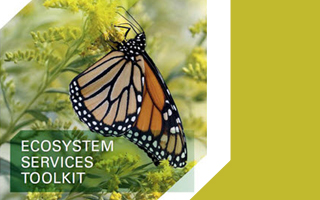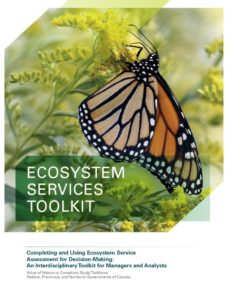
16 Mar Ecosystem Services Toolkit
Canada’s Federal-Provincial-Territorial (FPT) ministers responsible for conservation, wildlife, and biodiversity recently announced the release of the new Ecosystem Services Toolkit, “Completing and Using Ecosystem Service Assessment for Decision-Making: An Interdisciplinary Toolkit for Managers and Analysts.” This technical guide offers a practical, step-by-step guidance on ecosystem services assessment and analysis. Developed to satisfy a need identified by FPT governments, this practical resource is of interest to governments and their agencies at all levels, to academics, NGOs, and private practitioners in Canada and internationally.

The Toolkit is freely available for download. Click the image above to download the complete document as a PDF.
This new technical guide to ecosystem services (ES) assessment provides practical step-by-step advice on how to:
- Determine whether an ecosystem services approach is needed in a given situation;
- Complete a robust, fully interdisciplinary ecosystem service assessment;
- Understand what the results of such an assessment mean and what they do not mean; and,
- Incorporate ecosystem services analyses and considerations in a wide range of policy, decision, and management processes.
This Toolkit provides step-by-step guidance to complete a robust, comprehensive ES assessment. This includes guidance about the information, analysis, and process that can be helpful. The effort required to complete a thorough ES assessment depends on the complexity of the questions and the types of information and analysis needed to support the decision.
The guide also offers numerous resources for further understanding and direction. The Toolkit approach is fully interdisciplinary. It is meant to assist in addressing the need to build capacity to use ES assessment and to help reflect ES considerations in environmental management and decision-making. Roles for different kinds of knowledge are interwoven throughout this Toolkit. This is because ES are a result of the interactions between ecosystems and human societies. ES assessment and many of its component analyses will, therefore, be accomplished through interdisciplinary collaboration among biophysical scientists, social scientists, and economists in every step.
The Toolkit is being treated as a living document, and everyone is encouraged to use it and share their insights to inform future editions. Contact: Susan.Preston(@)Canada.ca.
The lead co-authors of the Ecosystem Services Toolkit were Dr. Susan Preston of Environment and Climate Change Canada, and Dr. Ciara Raudsepp-Hearne of McGill University on behalf of Canada’s Federal-Provincial-Territorial governments’ Value of Nature to Canadians Study Taskforce. The project benefited greatly from contributions from taskforce members and many colleagues in governments across Canada, the advice of an international interdisciplinary expert review panel, and discussions at international conferences.
Full citation:
Value of Nature to Canadians Study Taskforce. 2017. Completing and Using Ecosystem Service Assessment for Decision-Making: An Interdisciplinary Toolkit for Managers and Analysts. Ottawa, ON: Federal, Provincial, and Territorial Governments of Canada. (276pp)


